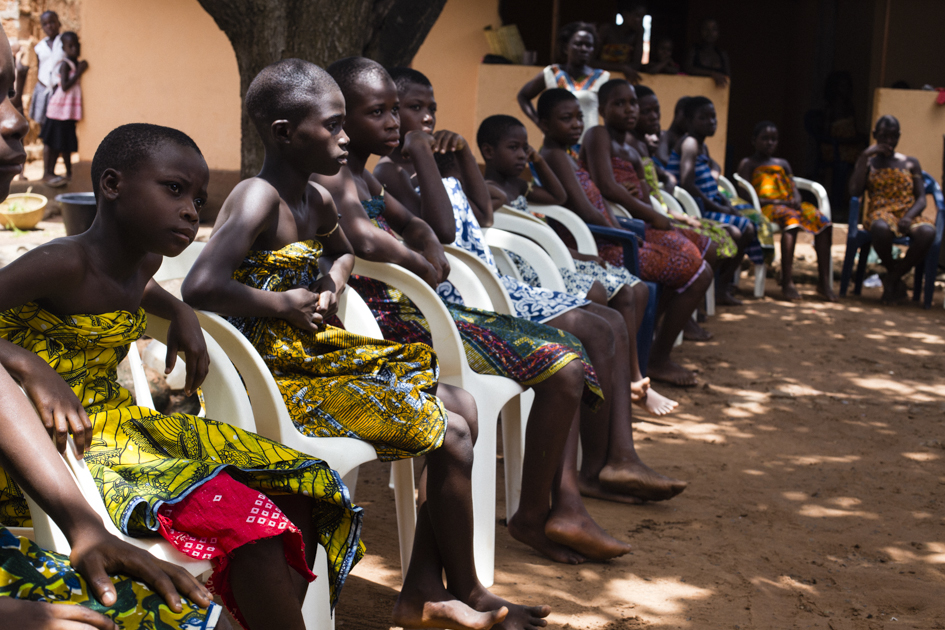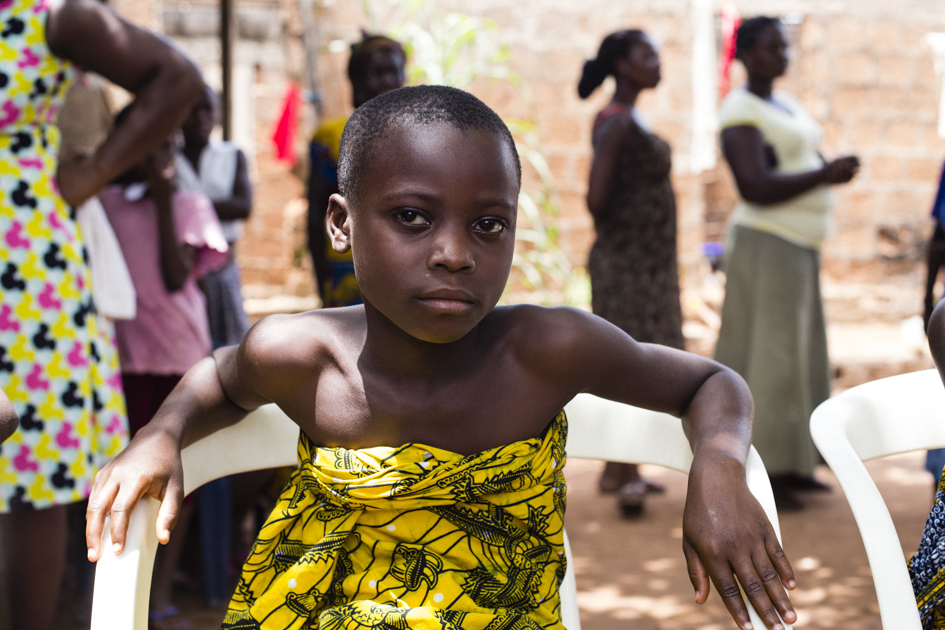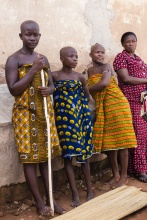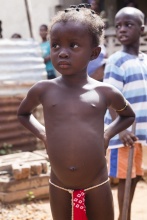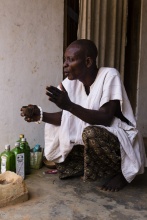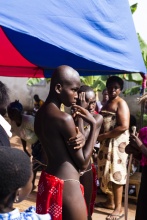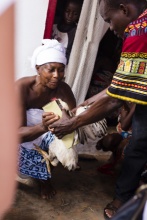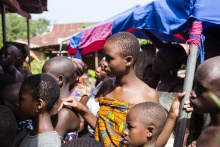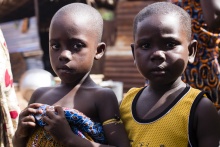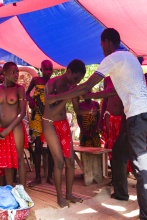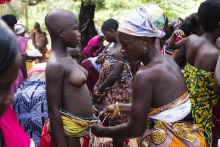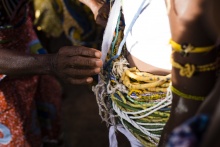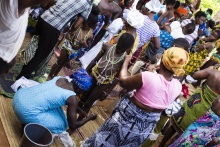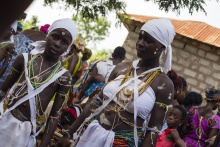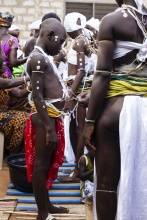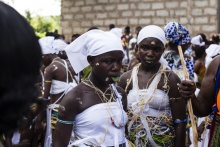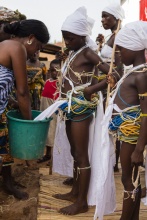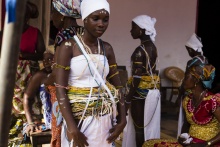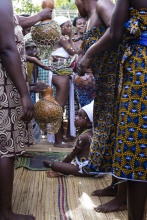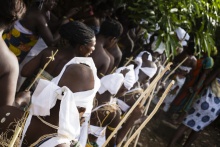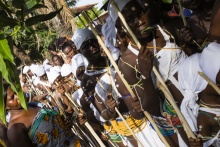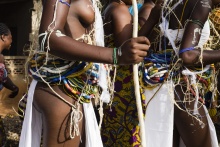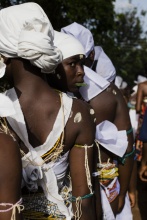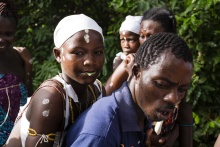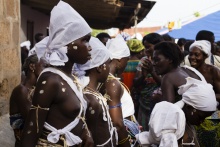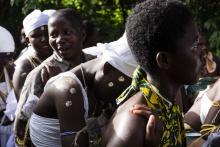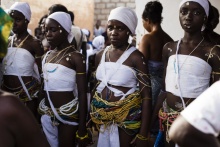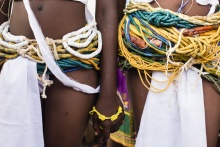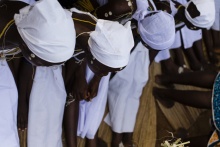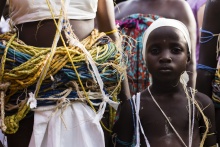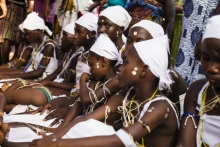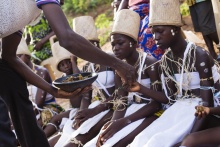































Dipo festival - Ghana
Dipo is a Ghanaian traditional festival celebrated by the people of Odumase in the Eastern region of Ghana. The festival celebrates girls who are virgins being ushered into puberty. It signifies that a woman, who partakes in it, is of age to be married. When the festival is announced, parents send their qualified girls to the chief priest. However these girls are expected to go through rituals and tests to prove their chastity before they qualify to partake in the festival. On the first day of the rites, a special ritual mother shaves the girls' heads and dresses them with a cloth around their waist which hangs down to their knees. This signifies their transition from childhood. They are paraded to the entire community as the initiates (dipo-yi). Early the next morning, the chief priest gives the initiates a ritual bath. He pours a libation to ask for blessings for the girls and then he washes their feet with the blood of a goat which their parents presented. This ritual is meant to drive away any spirit of barrenness. The crucial part of the rite is when the girls sit on the sacred stone to prove their virginity. Should a girl fail the test or be found pregnant, she is shunned by the tribe. For a week, the girls are then taken in and given training on cooking, housekeeping, child birth and child rearing. The ritual mothers give them special lessons on seduction and how to treat their husbands right. They also learn the Klama dance which will be performed on the final day of the rites with singing and drumming. At the end of the week, they are finally released and the entire community gather to celebrate their transition into womanhood. They are beautifully dressed in rich kente cloth and with beads around their waist, neck and arms, ready to perform the Klama dance. At the end of the rites any man interested in one of the women can start discussing plans with her family. It is said that any young woman who partakes in the rites not only brings honor to herself but to her family at large.
Dipo è una festa tradizionale del Ghana celebrata dal popolo di Odumase nella regione orientale del Ghana. Il festival ha il fine di accompagnare le ragazze vergini nell'età della pubertà, stando a significare che, chi vi partecipi, è in età per sposarsi. I genitori, dopo aver udito l'annuncio degli imminenti riti, inviano le loro ragazze qualificate al sommo sacerdote dove devono passare attraverso rituali e prove per dimostrare la loro castità prima che si qualifichino per partecipare al festival. Il primo giorno dei riti, le ragazze hanno le teste rasate e sono vestite con un panno intorno alla vita che copre solo fino alle ginocchia. Questi preparativi sono svolti dalle "madre dei riti" e stanno a significare la transizione dall'infanzia. Le ragazze sfilano per tutta la comunità e vengono chiamate le iniziate (dipo-yi). La mattina seguente, il sommo sacerdote concede loro un bagno rituale e svolge la libagione per chiedere la benedizione delle ragazze. Successivamente, per allontanare ogni spirito di sterilità, lava i piedi con il sangue di una capra portata dai loro genitori. La parte cruciale del rito coincide con l'atto di sedersi sulla pietra sacra da parte delle ragazze al fine di dimostrare la loro verginità. Se una di loro risultasse essere incinta o non essere vergine sarà detestata dalla comunità e non potrà fidanzarsi con alcun uomo della tribù. Le ragazze vengono poi portate in casa per una settimana, dove sono istruite su come cucinare, pulire e sulla nascita dei bambini e come allevarli. Le "madri dei riti" danno loro lezioni speciali sulla seduzione e come trattare a modo i loro mariti. Inoltre imparano la danza Klama che verrà eseguita l'ultimo giorno. Dopo una settimana di lezioni, sono finalmente libere e l'intera comunità si riunisce per celebrare la loro transizione nell'età della pubertà. Sono ben vestite in ricca stoffa Kente e con perle intorno alla vita, al collo e alle braccia. Con canti e tamburi, eseguono la danza Klama. A questo punto, qualsiasi uomo interessato ad una di loro può iniziare ad informarsi sulla famiglia. Si presume che qualsiasi donna che partecipi ai riti porta non solo onore a se stessa, ma per tutta la sua famiglia.
Dipo è una festa tradizionale del Ghana celebrata dal popolo di Odumase nella regione orientale del Ghana. Il festival ha il fine di accompagnare le ragazze vergini nell'età della pubertà, stando a significare che, chi vi partecipi, è in età per sposarsi. I genitori, dopo aver udito l'annuncio degli imminenti riti, inviano le loro ragazze qualificate al sommo sacerdote dove devono passare attraverso rituali e prove per dimostrare la loro castità prima che si qualifichino per partecipare al festival. Il primo giorno dei riti, le ragazze hanno le teste rasate e sono vestite con un panno intorno alla vita che copre solo fino alle ginocchia. Questi preparativi sono svolti dalle "madre dei riti" e stanno a significare la transizione dall'infanzia. Le ragazze sfilano per tutta la comunità e vengono chiamate le iniziate (dipo-yi). La mattina seguente, il sommo sacerdote concede loro un bagno rituale e svolge la libagione per chiedere la benedizione delle ragazze. Successivamente, per allontanare ogni spirito di sterilità, lava i piedi con il sangue di una capra portata dai loro genitori. La parte cruciale del rito coincide con l'atto di sedersi sulla pietra sacra da parte delle ragazze al fine di dimostrare la loro verginità. Se una di loro risultasse essere incinta o non essere vergine sarà detestata dalla comunità e non potrà fidanzarsi con alcun uomo della tribù. Le ragazze vengono poi portate in casa per una settimana, dove sono istruite su come cucinare, pulire e sulla nascita dei bambini e come allevarli. Le "madri dei riti" danno loro lezioni speciali sulla seduzione e come trattare a modo i loro mariti. Inoltre imparano la danza Klama che verrà eseguita l'ultimo giorno. Dopo una settimana di lezioni, sono finalmente libere e l'intera comunità si riunisce per celebrare la loro transizione nell'età della pubertà. Sono ben vestite in ricca stoffa Kente e con perle intorno alla vita, al collo e alle braccia. Con canti e tamburi, eseguono la danza Klama. A questo punto, qualsiasi uomo interessato ad una di loro può iniziare ad informarsi sulla famiglia. Si presume che qualsiasi donna che partecipi ai riti porta non solo onore a se stessa, ma per tutta la sua famiglia.
ITA - Informativa sui cookies • Questo sito internet utilizza la tecnologia dei cookies. Cliccando su 'Personalizza/Customize' accedi alla personalizzazione e alla informativa completa sul nostro utilizzo dei cookies. Cliccando su 'Rifiuta/Reject' acconsenti al solo utilizzo dei cookies tecnici. Cliccando su 'Accetta/Accept' acconsenti all'utilizzo dei cookies sia tecnici che di profilazione (se presenti).
ENG - Cookies policy • This website uses cookies technology. By clicking on 'Personalizza/Customize' you access the personalization and complete information on our use of cookies. By clicking on 'Rifiuta/Reject' you only consent to the use of technical cookies. By clicking on 'Accetta/Accept' you consent to the use of both technical cookies and profiling (if any).
Accetta
Accept Rifiuta
Reject Personalizza
Customize
ENG - Cookies policy • This website uses cookies technology. By clicking on 'Personalizza/Customize' you access the personalization and complete information on our use of cookies. By clicking on 'Rifiuta/Reject' you only consent to the use of technical cookies. By clicking on 'Accetta/Accept' you consent to the use of both technical cookies and profiling (if any).
Accetta
Accept Rifiuta
Reject Personalizza
Customize
Link
https://www.matteocarzanigaph.it/dipo_festival_ghana-r16797
Share on
facebook / twitter
Chiudi
Close
https://www.matteocarzanigaph.it/dipo_festival_ghana-r16797
Share on
facebook / twitter
Chiudi
Close


